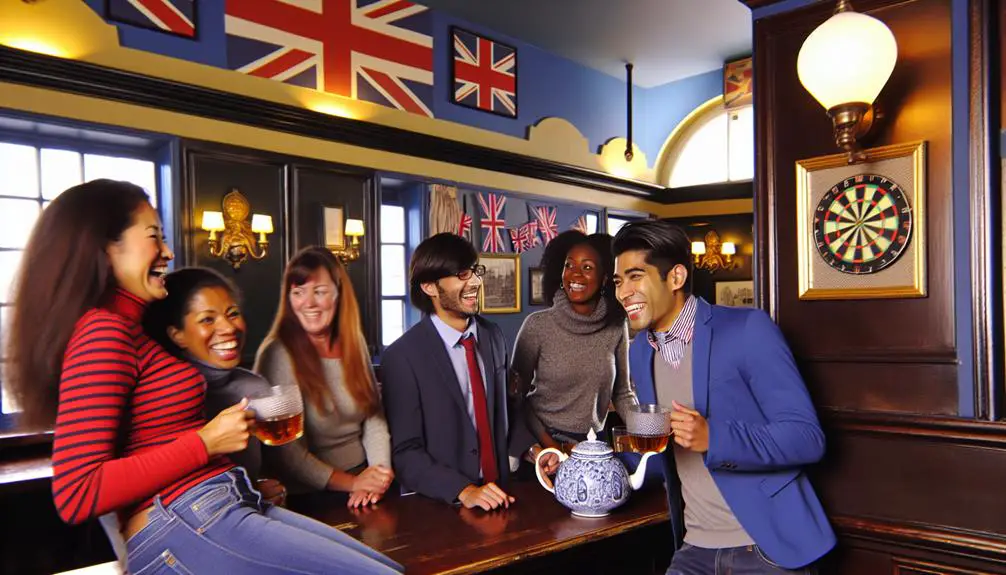In British slang, 'Babs' is a term of endearment, stemming from the diminutive of Barbara. Over time, it's evolved, showcasing the adaptability of language within societal trends. Initially a nickname, it now conveys warmth and affection, used among friends, partners, and even towards customers in a service setting to create a friendly atmosphere. 'Babs' varies regionally, reflecting the UK's linguistic diversity. Its usage in pop culture and social media emphasizes its role in everyday vernacular. Understanding its nuances, including polite usage and avoiding potential misunderstandings, enriches your interaction in the UK's social landscape. Discovering more about 'Babs' offers insight into its enduring charm and versatility.
Key Takeaways
- 'Babs' is used as a nickname and term of endearment in British slang.
- It reflects warmth and affection, often used among friends or partners.
- In pop culture, 'babs' appears in TV, music, and social media, enhancing its familiarity.
- Regional differences influence its usage and meaning across the UK.
- Misuse in professional settings or with strangers can lead to misunderstandings.
Origins of 'Babs'
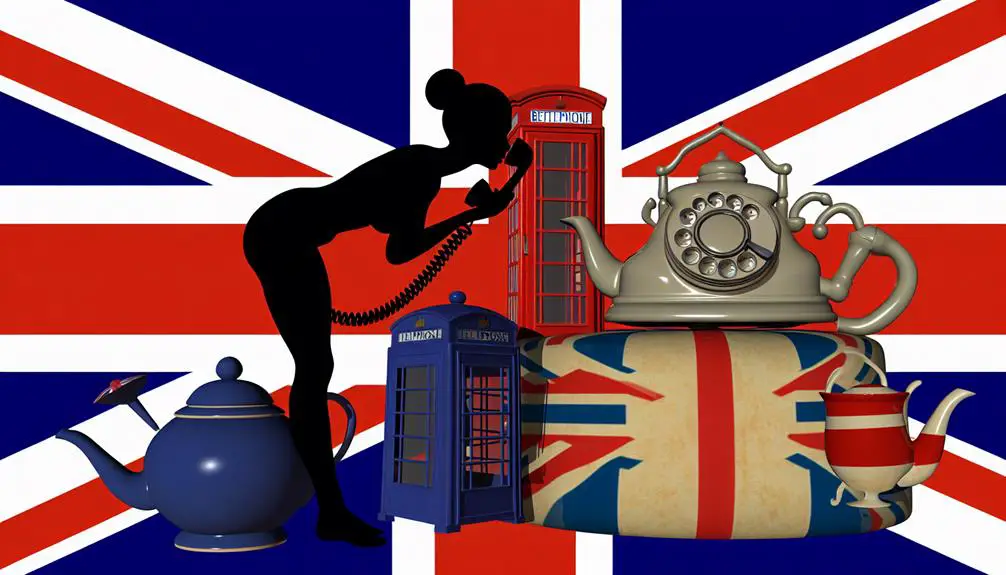
The term 'Babs,' deeply rooted in British slang, originates from a diminutive form of the name Barbara, revealing its layers of linguistic evolution that have transformed 'Barbara' into 'Babs,' showcasing a fascinating journey from formal nomenclature to affectionate colloquialism. Historically, the name Barbara, of Greek origin meaning 'foreign,' was Anglicized and became a common name in Britain. Over centuries, a trend emerged in English-speaking cultures to create endearing, shorter forms of names, especially for those used affectionately.
'Babs' is a prime example of this linguistic evolution. It's not just a simple truncation but a manifestation of linguistic affection, a phonetic simplification that endears and personalizes. The transformation from 'Barbara' to 'Babs' illustrates a broader phenomenon in language where complexity gives way to brevity and warmth, reflecting societal changes in communication styles and interpersonal relationships. This process, deeply embedded in the fabric of English language development, highlights the dynamic nature of linguistic adaptation and cultural influence, underscoring the importance of understanding language as a living entity that evolves with society.
Common Meanings
Understanding the origins of 'Babs' sets the stage for exploring its diverse meanings in contemporary British slang, where it's not merely a nickname but embodies a range of sentiments and contexts. Its usage has evolved greatly, reflecting the dynamism inherent in slang evolution. Initially, 'Babs' might have simply denoted a person's name, typically short for Barbara. However, as its popularity in colloquial speech surged, the term began to acquire additional, more nuanced connotations.
In the landscape of British slang, 'Babs' has come to signify affection or endearment towards someone, not necessarily named Barbara. This transformation underscores the fluid nature of language and how terms can expand beyond their original definitions. The term's popularity has cemented its position in everyday vernacular, making it a versatile addition to the lexicon of British informal speech.
Moreover, 'Babs' reflects the cultural tendencies of adopting personal names as broader slang terms. This evolution from a specific name to a term of endearment illustrates the creative adaptability of slang, allowing it to capture the essence of companionship and familiarity. Through this lens, 'Babs' serves as a proof to the enduring nature of slang to innovate and mirror societal trends.
Variations in Use
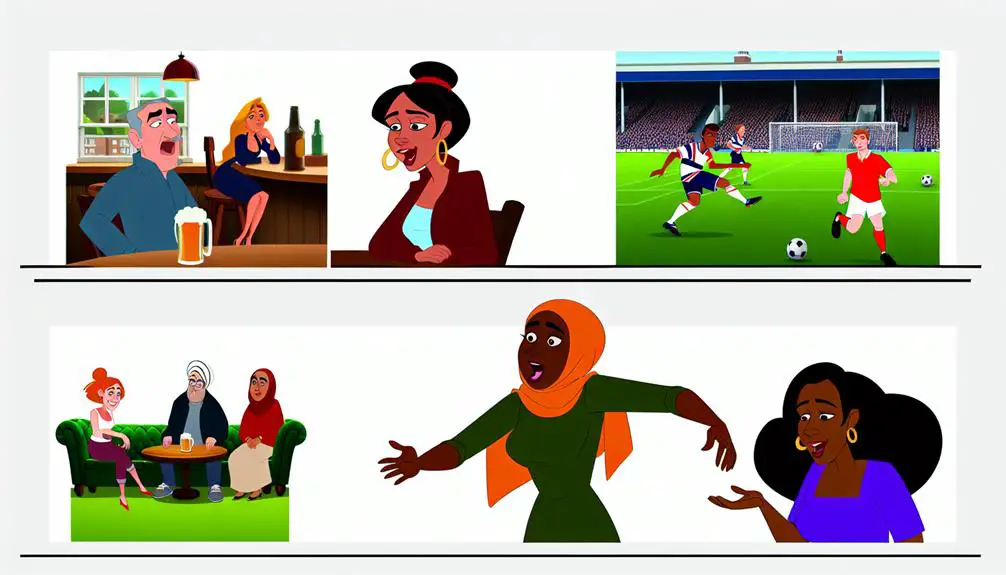
Delving into the variations in use, it's clear that 'Babs' has morphed across different contexts, showcasing the term's adaptability and nuanced significance in British slang. The term's flexibility is anchored in its etymology and pronunciation, which have played pivotal roles in its evolution within the linguistic landscape. Understanding these variations requires a closer look at its usage:
- Nicknames: Originally derived from 'Barbara,' the name 'Babs' serves as an affectionate diminutive. This use underscores the friendly, casual nature of British slang, where shortening names often conveys warmth and intimacy.
- Terms of Endearment: Beyond nicknames, 'Babs' can function as a term of endearment, directed not only at individuals named Barbara but also at loved ones irrespective of their names. This variation highlights the term's emotional resonance within personal relationships.
- Character Traits: In some contexts, 'Babs' is used to describe someone with qualities or characteristics reminiscent of a stereotypical 'Babs'—perhaps bubbly, approachable, or resilient. This usage illustrates the term's capacity to convey complex character assessments succinctly.
Analyzing 'Babs' through these lenses—nicknames, terms of endearment, and character traits—reveals the depth of its etymology and the nuances of its pronunciation, which collectively enrich its significance in British slang.
Regional Differences
You'll find that 'babs' doesn't hold the same meaning across the UK, showcasing significant regional differences. Each area's unique cultural context shapes its usage, with specific nuances and connotations that vary from place to place. Understanding these geographic variations provides insight into the term's fluidity and the diverse linguistic landscape of British slang.
Geographic Variations
Throughout the UK, the meaning of 'babs' can vary considerably depending on the region, reflecting the rich tapestry of local dialects and cultural nuances. The term's adaptability showcases the profound impact of:
- Dialectical influences: In some areas, 'babs' is deeply woven into the fabric of local speech patterns, adapting meanings that resonate with regional identities.
- Cultural references: Historical and contemporary cultural landmarks often shape the context in which 'babs' is used, making it a linguistic mirror of societal shifts.
- Socio-linguistic evolution: As communities evolve, so does the language, with 'babs' morphing to encapsulate new realities and relationships within different UK regions.
This complexity underlines the importance of understanding the geographical nuances that influence the interpretation and usage of 'babs' across the British Isles.
Usage by Area
Exploring the regional differences in the use of 'babs' reveals a captivating landscape of linguistic diversity across the UK, where each area's unique cultural and historical context profoundly shapes its interpretation and application. The term's dialectal acceptance varies greatly; in some regions, 'babs' is a term of endearment, while in others, it might be seen as informal or even unfamiliar. This dissimilarity underscores the rich tapestry of linguistic evolution within the British Isles. As you investigate further into each area's usage, you'll notice how dialects reflect social, historical, and cultural influences, making 'babs' a word with multiple layers of meaning. Understanding these nuances offers a window into the complex interplay between language and identity in the UK.
In Pop Culture
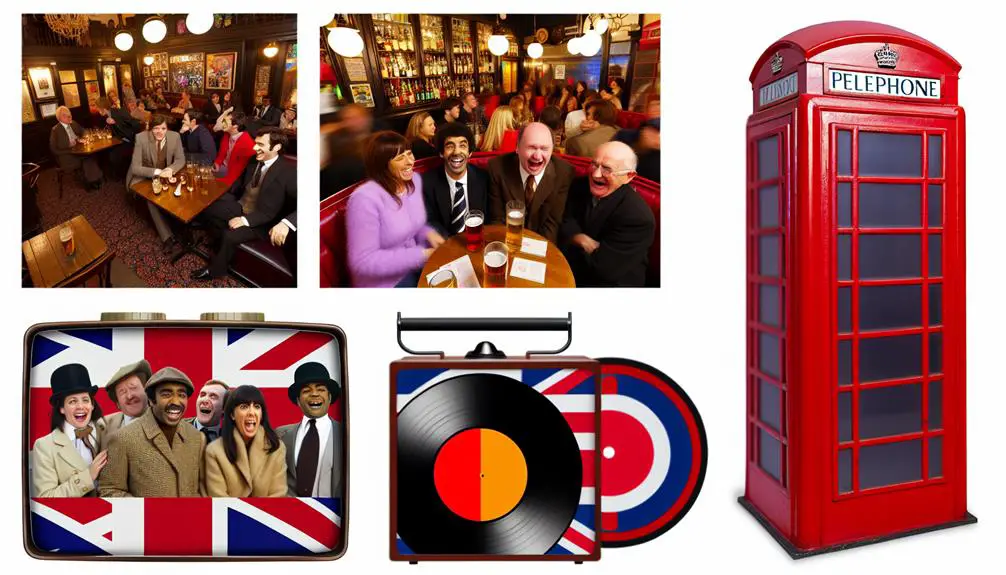
In recent years, 'babs' has permeated pop culture, becoming a term frequently encountered in British television shows, music, and social media platforms, reflecting its widespread acceptance and usage. The term's integration into the vernacular of celebrities and its appearance in scripted content and reality television alike underscore its colloquial charm and versatility. Here's how 'babs' has made its mark:
- Celebrity Nicknames: It's become commonplace for British celebrities and fans alike to adopt 'babs' as an affectionate nickname, signaling a sense of familiarity and endearment. This casual use by public figures has substantially bolstered the term's popularity, making it a staple in the lexicon of both the entertainment industry and everyday conversations.
- Television References: From comedies to dramas, 'babs' has been scripted into the dialogue of characters, often to add a touch of authenticity and regional flavor. Its use helps to establish a connection with the audience, particularly those familiar with British slang, and adds depth to character development.
- Social Media Platforms: The hashtag #babs has seen a surge in usage across various social media platforms, where users share content that embodies the spirit of the term. Whether it's in jest, affection, or nostalgia, the term's presence online is a sign of its cultural resonance and adaptability.
How to Use 'Babs'
Understanding the common usage contexts of 'Babs' is important; it's often employed affectionately towards friends or familiar individuals, but can vary depending on the setting and relationship dynamics. To navigate its polite use, you'll need to assess the familiarity and comfort level of those involved, making sure it enhances the conversation rather than causing discomfort. This nuanced approach guarantees you leverage 'Babs' effectively in social interactions, respecting its cultural undertones and the sensibilities of your audience.
Common Usage Contexts
When exploring the common contexts where 'babs' is used in British slang, it's vital to acknowledge its versatility in everyday conversations, often serving as an affectionate term for both friends and strangers alike. Understanding the Babs pronunciation is important, as it directly influences the term's perception and acceptance in various settings. Alternative nicknames, while numerous, seldom capture the same endearing quality.
- Casual Greetings: 'Morning, babs!' conveys warmth in informal settings.
- Terms of Endearment: Used between close friends or partners, enhancing the bond.
- Customer Service: Occasionally, workers in the service industry might address customers as 'babs' to foster a friendly atmosphere.
Analyzing these contexts highlights 'babs' as a multifaceted term, adept at enriching social interactions with its inherently affectionate connotation.
Tips for Polite Use
Having explored the common contexts of 'babs' in British slang, it's now important to ponder how you can use this term politely and appropriately in various social settings. Cultural sensitivity and etiquette guidelines are paramount when incorporating 'babs' into your vocabulary.
| Context | Polite Use | Note |
|---|---|---|
| Casual Conversations | Use among friends or close colleagues. | Confirm a familiar and informal setting. |
| Formal Settings | Avoid or use sparingly with clear affection. | Context should justify its use. |
| Regional Sensitivity | Be mindful of regional variations and acceptance. | Some areas may find it more endearing than others. |
To navigate these social nuances, always gauge the comfort and familiarity of your audience. Understanding these dynamics ensures your usage of 'babs' is both respectful and contextually appropriate, aligning with cultural sensitivity and etiquette guidelines.
Misunderstandings and Clarifications
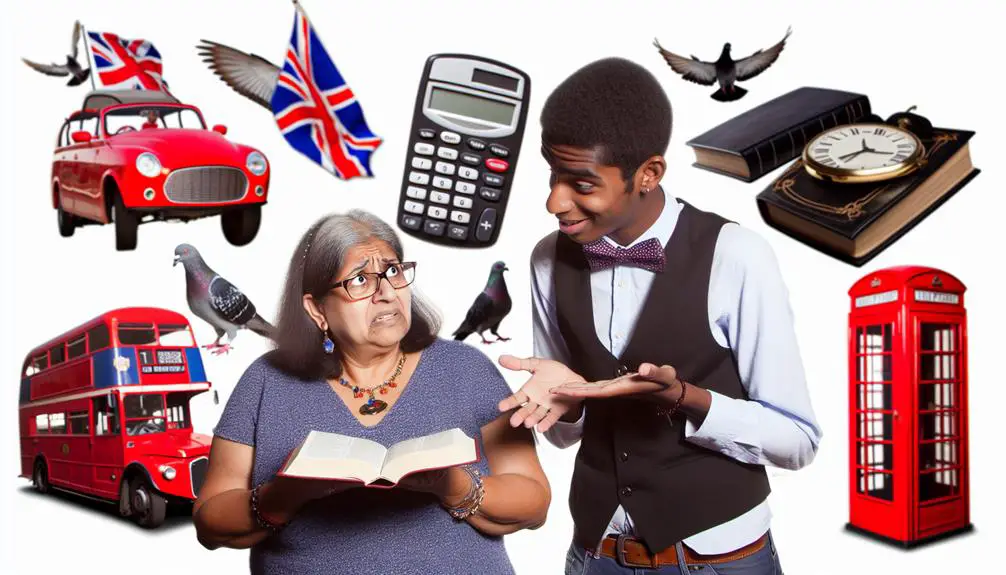
Many often misconstrue the term 'babs' in British slang, overlooking its nuanced meanings and cultural implications. It's vital to dissect these misunderstandings to appreciate the depth of this colloquial term fully. Here's a breakdown focusing on cultural interpretations and etiquette nuances:
- Cultural Interpretations: 'Babs' might seem straightforward, but its meaning can vary greatly across different regions in the UK. What's considered a term of endearment in one area might not hold the same warmth in another, leading to potential social faux pas if misused. Understanding the local interpretation is key to its appropriate application.
- Etiquette Nuances: The context in which 'babs' is used cannot be emphasized enough. It's generally seen as informal and friendly, but using it in a professional setting or towards someone you've just met without evaluating their comfort level can be seen as rude or presumptuous.
- Misinterpretation Correction: When you hear 'babs' used in conversation, it's crucial to take into account the speaker's intent and the relationship dynamics at play. Misinterpreting it as condescending or overly familiar without these considerations can lead to unnecessary friction.
'Babs' in Social Media
In today's digital age, you'll find that the term 'babs' has permeated social media platforms, evolving in usage and significance as it intersects with online culture and communication norms. This adaptation reflects not just a linguistic shift but also a broader cultural embrace that highlights the fluidity of digital interactions. As you navigate through various social media landscapes, understanding the nuances of 'babs' etiquette becomes important. It's a term that, when used appropriately, can foster a sense of camaraderie and affection but misused, it might lead to confusion or offense.
The digital 'babs' trends reveal a fascinating insight into how language evolves in response to social media dynamics. Hashtags incorporating 'babs' have become a staple in personal posts, signaling a trend towards more informal, endearing communication. Additionally, influencers and content creators have adopted 'babs' to engage with their audience on a more personal level, blurring the lines between public and private personas. This trend underscores the importance of linguistic agility in maintaining relevance and connectivity in the digital domain. As 'babs' continues to weave its way through online interactions, understanding its context, ensuring that your digital communication is both respectful and resonant.
Future of 'Babs' in Slang
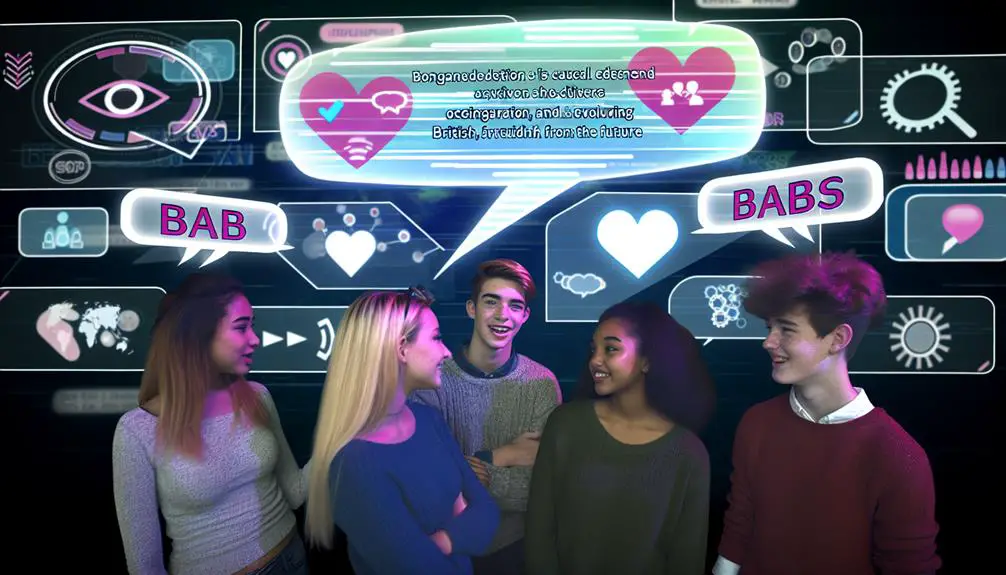
As we examine the trajectory of 'babs' within slang, it's evident that its evolution will continue to mirror the rapid changes in digital communication and societal trends. The adaptability of slang terms like 'babs' is essential in understanding not only their survival but their thriving presence in our everyday language. Looking ahead, several factors will influence the direction and usage of 'babs' in the linguistic landscape:
- Digital Evolution: The ease of spreading and transforming language through social media platforms and messaging apps will guarantee 'babs' remains a vibrant part of our digital lexicon. This digital evolution will likely introduce new variations and meanings, further enriching its usage.
- Cultural Impact: As cultures continue to intersect more frequently due to globalization, 'babs' may adopt new nuances and meanings that reflect these cultural exchanges. This blending of linguistics and cultural impact ensures the term's relevance and adaptability across different demographics.
- Future Linguistics Research: Scholars and linguists will no doubt continue to study the phenomenon of slang like 'babs', providing insights into its linguistic significance and the mechanisms behind its persistence and evolution in modern language.

